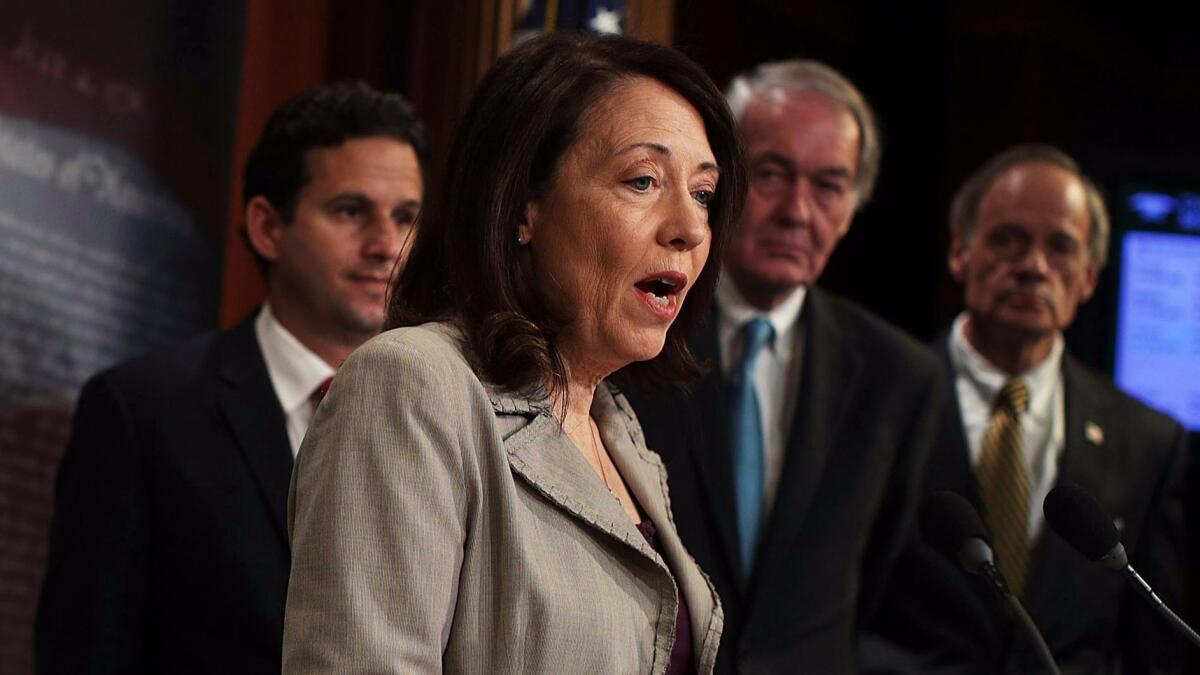Senate Democrats fail in first attempt to save state and local tax deduction

Senate Democrats on Thursday failed in their first attempt to save the state and local tax deduction, which helps many residents of California and other high-cost states reduce their federal income tax bills.
The Republican-controlled Senate voted 52 to 47 to reject an amendment that would have prevented the Senate from considering any bill that repeals or limits the deduction as part of a planned tax overhaul. No Republicans supported the amendment.
But the fight over the break, which the Republican tax plan would scrap, is far from over as legislative efforts in Congress are just beginning.
And supporters of the deduction seized on a new argument Thursday, noting that the Republican tax overhaul framework does not propose to eliminate the ability of corporations to deduct state and local taxes as a business expense.
“Corporations can claim it; individuals can’t? Isn’t that backward?” Senate Minority Leader Charles E. Schumer (D-N.Y.) asked Thursday in a speech on the Senate floor. “It shouldn’t be taken away from either one.”
In releasing a tax overhaul framework last month, White House officials and top congressional Republicans said they envisioned repealing unnamed business tax deductions but noted that lawmakers might decide to keep some of them.
Senate Finance Committee Chairman Orrin Hatch (R-Utah) recognizes that every tax provision “has an important constituency and consequence,” said his spokeswoman, Julia Lawless, on Thursday. Hatch plans to work with senators to “examine these provisions and make appropriate decisions.”
Sens. Maria Cantwell (D-Wash.) and Chris Van Hollen (D-Md.) sought to preserve the deduction for individuals by attaching an amendment to the Republicans’ 2018 fiscal year budget resolution, which is key to passing a tax bill. The amendment’s prohibition on repealing or limiting the deduction could have been waived only if at least 60 senators agreed to do so, which would have required Democratic support.
The amendment was supported by groups fighting to save the deduction, including the National Governors Assn. and the U.S. Conference of Mayors. They argue that the deduction prevents double taxation because it assures people won’t be taxed on money they pay for state and local taxes.
The state and local deduction is the most popular itemized deduction and is claimed by about 43 million taxpayers, according to the nonpartisan Tax Foundation.
The break allowed Californians to reduce their combined taxable income by $101 billion in 2014 — one-fifth of the total value of the deduction nationwide, according to an analysis by the Tax Foundation.
Most of the states that would be hit hardest by the loss of the deduction are Democratic strongholds, including California, New York and New Jersey.
Eliminating the deduction would generate as much as $1.8 trillion over the next decade and help pay for the large tax cuts in the Republican plan that are focused on corporations and the wealthy.
Trump administration officials and top congressional Republicans said the state and local tax deduction mostly helps high earners and forces residents in low-tax states to subsidize those in high-tax states.
“We cannot let an unwillingness to reduce deductions for the wealthy stand in the way of relief for the middle-class working folks in this country,” said Sen. Shelley Moore Capito (R-W.Va.). She noted that only 1% of the benefit from the deduction went to taxpayers with annual incomes below $50,000.
But Sen. Ron Wyden (D-Ore.) countered that more than half of the taxpayers who claim the deduction earn less than $100,000 a year.
“These hardworking middle-class folks are not going to appreciate Congress double taxing them,” he said.
Supporters of the deduction also said that California and the other states whose residents would be most affected by its elimination already send more tax money to the federal government than they receive back in services.
House Republican lawmakers from high-tax states are pushing to save the deduction by adding new limits. One proposal would limit the deduction to individuals with adjusted gross incomes of no more than $400,000, or $800,000 for married couples.
Such a limit would preserve the deduction for all but the top 1% of earners — those with adjusted gross incomes above about $465,000 — according to an analysis by the Tax Foundation. But limiting rather than scrapping the deduction would raise only about a quarter of the additional revenue that Republicans are seeking to offset their tax cuts.
Twitter: @JimPuzzanghera
ALSO
What Republicans still need to do before voting on a tax plan
Mnuchin warns of ‘significant’ stock market drop if tax reform fails
Mayors say many American families would be hurt by GOP plan to kill state and local tax deduction
UPDATES:
3:35 p.m. This article was updated with additional detail about the amendment.
11:50 a.m.: This article was updated with details about the Senate vote and comment from a spokeswoman for Sen. Orrin Hatch.
This article originally was published at 10:40 a.m.







